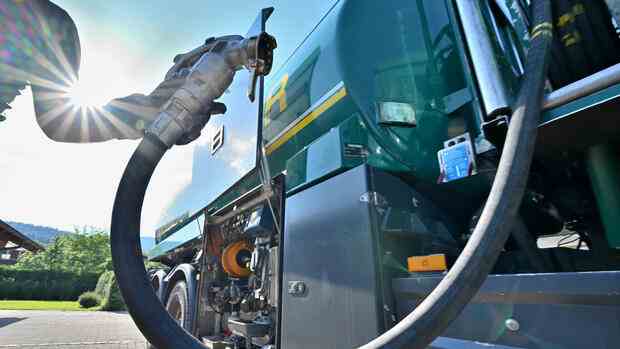In Germany, around ten million homes are heated with oil.
(Photo: IMAGO/Rolf Poss)
Berlin The heads of the governing coalition have agreed in the last few meters to extend the energy price brake. The traffic light will also provide help in the form of a retrospective price brake for citizens who heat with oil, wood pellets or liquid gas. The Handelsblatt learned this from coalition circles.
Users of such heaters can therefore submit their heating bills from 2022 to a government agency. If the costs contained therein are more than twice as high as in 2021, the price brake takes effect. Then the state pays 80 percent of the amount that exceeds doubling the costs.
The traffic light provides 1.8 billion euros in a hardship fund. The ARD had also reported on this.
In their decision, the ministries and chancellery initially provided that only recipients of social assistance receive subsidies for oil, pellet and liquid gas heating systems. The help should have been processed via the job center.
Top jobs of the day
Find the best jobs now and
be notified by email.
However, the government factions have now agreed on a different approach and want to pay out the aid for the types of heating mentioned without a means test. Instead of the job center, the federal states should therefore take care of the processing.
Agreement on bonuses and dividends
Shortly before that, the leaders of the parliamentary group had already clarified another important matter, which affects the energy price brake for the economy. The parliamentary group leaders of the SPD, Greens and FDP have agreed with their budgets on a compromise for the payment of bonuses for management and supervisory boards and the payment of dividends if companies make use of the energy price brakes. This was confirmed to the Handelsblatt from coalition circles.
At the parliamentary group meetings on Tuesday, the MPs still have to agree in large groups. The compromise looks like this: If companies receive state support of between 25 and 50 million euros through the electricity and gas price brake, they are not allowed to increase the bonus payments intended for company management in the coming year.
The leaders of the traffic light groups have agreed on the controversial issue of bonuses and dividend bans as part of the energy price brakes.
(Photo: IMAGO/Christian Spicker)
The distribution of dividends remains unaffected. From an aid payment of 50 million euros, neither bonuses nor dividends may be paid out. The “Spiegel” reported about it first.
The traffic light has thus cleared up the last major issue of energy price brakes. Ministries and the Chancellery had originally agreed that companies could continue to distribute bonuses and dividends as they wished – even if they took advantage of the gas and electricity price brake.
Compromise despite budget decision
The traffic light representatives in the budget committee of the Bundestag had made a far-reaching decision a month and a half ago: “no dividends, bonuses, special payments in the form of share packages or other separate remuneration” for users of the price brakes.
And the decision went so far that the committee pretended not to unlock the financial resources that are needed for the aid.
>> Read here: Traffic light deputies contradict government – bonus and dividend ban becomes a point of contention
It was to be expected that the householders would not get away with a complete ban on bonuses and dividends. This is considered to be administratively unfeasible, especially for smaller companies. At the same time, however, it was clear that the MPs would not completely back away from their resolution. The small-scale, now agreed compromise was therefore negotiated over several weeks.
The agreement of the traffic light politicians comes just before scarce. The Bundestag must pass the laws on gas and electricity price brakes this week. The Federal Council should then finally agree on Friday. The price brakes are to be paid out from March, but will also apply retrospectively to January and February.
More: How long does the gas last? These are the scenarios for the winter
